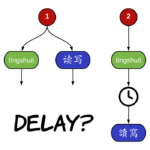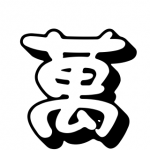 For some, the allure of Chinese lies in language and culture, but for many, practical utility is more important. So, how long do you have to study Chinese to make it useful?
For some, the allure of Chinese lies in language and culture, but for many, practical utility is more important. So, how long do you have to study Chinese to make it useful?
While this question is simple, and most who ask it expect a simple answer, the truth is that the answer depends on what you want Chinese to be useful for.
Tune in to the Hacking Chinese Podcast to listen to the related episode:
Available on Apple Podcasts, Google Podcast, Overcast, Spotify, YouTube and many other platforms!
Chinese doesn’t suddenly become useful when you reach a certain threshold
Proficiency in Chinese increases gradually over time as you invest time and energy into studying. As you learn more, you will be able to use Chinese to deal with an ever-increasing number of real-world communicative situations, thus making the language more useful. At no point is there a certain threshold before which Chinese was not useful, but after which it suddenly is.
At least not if we ignore artificial use cases, such as passing a proficiency test to acquire a certificate that allows you to do something useful. In that case, there really is a threshold, but it’s arbitrarily imposed by an institution and has little bearing on real-world applications.
The truth is that knowing more Chinese is always more useful, so the question of when it becomes useful is bunk. The answer is that it becomes useful from day one, but studying another day makes it even more useful, even if you’ve studied for a thousand days already.
Make Chinese useful for what? For whom?
I think that people who ask the question of how long you have to learn Chinese to make it useful often have a more specific question in mind. What they actually want to know is how long it takes them to reach a level where they can do something they have in mind.
Naturally, the answer then depends on what that thing is. It doesn’t take more than a few hours to learn some words and phrases that will be helpful on your trip to China, but it clearly takes longer if you want to read original, historical documents in Chinese for a research project.
The specific use case is often omitted, however, which is true for the public debate about learning foreign languages as well. Having worked with language teaching and related professional development for almost a decade now, it’s common to hear people say that learning foreign languages in school is a waste of time because it takes too long before it becomes useful.
This seems to imply that the only reason to study languages is to use it to do business with other countries or operate professionally in those countries. It also assumes that language learning is only useful in those situations if you have reached full working proficiency.
Chinese is useful beyond business and work
This overlooks the fact that knowing even a little bit of Chinese can be immensely helpful in a professional context. No, you won’t be able to negotiate a contract or read a legal contract in Chinese after studying for one semester, but you will know enough to show that you’re interested and start building a relationship with other people.
In general, Chinese people greatly appreciate people trying to learn their language, and I’ve had many clients over the years who have used very limited Chinese to great effect in a professional context.
Beyond that, learning Chinese can be useful in other senses of the word. Here are some examples. Learning Chinese is useful because it
- gives you access to a new culture.
- allows you to see your own culture in a new light
- makes you understand what it’s like to learn a new language
- enables you to connect with Chinese people on a different level
- allows you to connect with other second-language learners
- keeps your mind and memory active
Most of these reasons are relevant even if you have only studied Chinese for a short time. Naturally, the more you learn, the more useful it becomes, but as I said earlier, it’s simply not true that you have to study Chinese for years before it becomes useful.
So how long does it take to make Chinese useful?
As we have seen, to give a simple answer to this question, we need to make assumptions about what you want to use it for. It’s incredibly difficult to answer questions like this based on solid data, because the data that does exist is fragmented and hard to compare. Another problem is that there are too many variables in play, so we simply can’t say “it takes X years to be able to do Y”. And even if we could, years is clearly not the right unit to use here. One day, I might try to write an article about that specifically, but not today.
In the meantime, I think it would be interesting to outline a few milestones based on what I have observed in students I teach/coach, and my general experience. Of course, people are different, so your mileage may vary, but I thought it would be interesting to give some estimates. It would be interesting to hear what other advanced students or teachers think about these estimates!
 If you want to be able to say some things in Chinese to facilitate other activities, and you know in advance what these will be, you can get far with only a hundred hours. You can cram this into a month-long crash course or study a few hours per week for a year, but note that if you dilute learning too much, you will start forgetting things. A hundred hours will allow you to learn basic pronunciation, the most common words and phrases, along with some practice to use them. If you ignore the written language, you’ll get even further.
If you want to be able to say some things in Chinese to facilitate other activities, and you know in advance what these will be, you can get far with only a hundred hours. You can cram this into a month-long crash course or study a few hours per week for a year, but note that if you dilute learning too much, you will start forgetting things. A hundred hours will allow you to learn basic pronunciation, the most common words and phrases, along with some practice to use them. If you ignore the written language, you’ll get even further. If you want to be able to communicate somewhat effectively about topics related to yourself and your life, expect to invest a thousand hours or so. This would mean six months if you study full time, or four years if you spend an hour each workday every week. Scott Young documented his first 750 hours in detail and was able to reach HSK 4 in that time, but I assume here that most people would take slightly longer.
If you want to be able to communicate somewhat effectively about topics related to yourself and your life, expect to invest a thousand hours or so. This would mean six months if you study full time, or four years if you spend an hour each workday every week. Scott Young documented his first 750 hours in detail and was able to reach HSK 4 in that time, but I assume here that most people would take slightly longer. If you want to be able to use Chinese professionally and be able to communicate about a wide range of topics in both spoken and written Chinese, without language being a major issue, you should expect to spend at least ten thousand hours. That’s full-time studying for five years, or a lifetime if you spread it out much more. This estimate is only meant as a baseline, because you would need considerably more than that to approach a near-native level, but you can get away with much less if the topics you need to deal with are limited. I wrote a bit more about investing a lot of time into learning Chinese here: The 10,000 hour rule – Blood, sweat and tears.
If you want to be able to use Chinese professionally and be able to communicate about a wide range of topics in both spoken and written Chinese, without language being a major issue, you should expect to spend at least ten thousand hours. That’s full-time studying for five years, or a lifetime if you spread it out much more. This estimate is only meant as a baseline, because you would need considerably more than that to approach a near-native level, but you can get away with much less if the topics you need to deal with are limited. I wrote a bit more about investing a lot of time into learning Chinese here: The 10,000 hour rule – Blood, sweat and tears.
These milestones are very rough estimates, and you might find yourself at one of these milestones and think that my estimate is too optimistic or too pessimistic. Maybe you were able to work fully in Chinese after just three years, or you have studied for much longer than a thousand hours and still struggle with everyday conversations.
That’s okay! The goal here wasn’t to say what you ought to have achieved, it was to try to give some idea of how long it takes to reach various definitions of “useful” in a professional context. If you think your Chinese isn’t as good as it ought to be, though, I suggest you check out Why your Chinese isn’t as good as you think it ought to be.
Moving the goal posts My thoughts on the usefulness of learning Chinese
My motivation for learning Chinese has changed over the years. which is true for most learners. Let me go through my own process briefly to illustrate how thoughts of what is useful can change over time. If you want to know more about my journey to learn Chinese, I’v written a series of articles about that, starting here: How I learnt Chinese, part 1: Where it all started.
Now, let’s look at my thoughts about usefulness:
- When I started learning, I did it mostly for fun. I thought it would be useful to understand a little bit about a truly foreign language and perhaps I would travel to China one day or talk with Chinese people elsewhere in the world.
- When I had studied for a year or so, I realised that while I could certainly have simple conversations, read and write a bit, and so on, it wasn’t really enough to exchange ideas of any deeper significance with native speakers.
- So I moved to Taiwan and studied another year, which made it possible to make friends, experience language and culture, and I could also function relatively well in a Chinese-speaking society, dealing with bank errands, renting an apartment, make travel arrangements and so on. But I also understood that this wasn’t enough to make it professionally useful.
- So I studied another year, thinking that it would give me a solid enough foundation to teach the language (I was already on my way to becoming an English teacher when I started learning Chinese). That left me where I could definitely teach beginners with some confidence, but it was just barely enough to engage with native content and participate in all-native discussions on some kind of acceptable level.
- So I kept studying, eventually going to Taiwan for a master’s degree in teaching Chinese as a second language, taught entirely in Chinese mainly for native speakers. Surviving such a programme would really make sure my Chinese was useful. Finally, the Holy Grail!
Not really. I’ve since kept learning Chinese in some fashion for almost a decade, and there are many things I still can’t do in Chinese. I can’t write fiction in an acceptable way, I still need to double-check formal writing and so on. I can teach professional development courses in Chinese for native speakers, but my grasp of domain-specific vocabulary could be much better.
Conclusion: Yes, learning Chinese is useful
The point is that Chinese has been useful for me all the time, but the range of possible applications has increased in parallel with my proficiency. Knowing Chinese can always useful in some way, as is language learning in general. The question only has a relatively simple answer if you have a very narrow definition of “useful”, but I don’t see why would thus restrict ourselves.

Tips and tricks for how to learn Chinese directly in your inbox
I've been learning and teaching Chinese for more than a decade. My goal is to help you find a way of learning that works for you. Sign up to my newsletter for a 7-day crash course in how to learn, as well as weekly ideas for how to improve your learning!
4 comments
The problem with learning Chinese is that for a long, long time learning Chinese was not about being proficient with the language. It was about becoming a Sinologist and reading classical Chinese literature. There is still a snobbery today in Chinese learning that looks down on mere ‘useful’ practitioners and assumes anyone who is learning *must* be pursuing an academic career as a linguist. The unspoken mentality pervades a lot of study materials, although this is getting slowly better.
I’d like to see a post on this phenomenon. I remember learning from a very popular book published in Beijing and on lesson 4 or so, the word “geography” was taught. This is for rank beginners, lesson freaking 4, a word like “geography”. I asked online why I was learning a totally useless word like this instead of something like, I don’t know, “where’s the bathroom”? I was told off in no uncertain terms and informed to go get a phrasebook if I wanted to learn like that. The word would become useful years later in my studies, I was told. Since something like 95% of Chinese learners never get past beginner level, I really questioned the validity of that assumption. BUT it all makes sense if you’re an academic pursuing a 4 year degree that will eventually end with you reading classical Chinese.
Everyone uses their Chinese in different ways. Some people focus on reading and writing and can read Classical Chinese novels in the original. Other people focus on listening and speaking and you would think they are native speakers. If you are in a solid Chinese program you are probably getting a more well-rounded education. I think ultimately you have to come to your own definition of what being proficient in Chinese means. I mean you have to be motivated by something that pushes you further and outside a school curriculum. While I never got into reading comic books or literature, I remember buying a small pocket radio in Taiwan in 2009 and listening to local radio. Now it is 2017 and I still listen to Chinese radio on my smart phone. Just find your joy in learning Chinese or your interest will never leave the classroom.
This chimes with my experience. I work full time so learning Chinese is just a hobby. It took me roughly 4 years to lower intermediate level which I think is the level you are describing as the second step (1000 hours). However, reaching near native level is obviously quite far away. I‘d be interested to hear how many hours you think are necessary to reach upper intermediate -appreciating that study methods and goals can be very different once you are past the beginner stage. Very useful podcast. Thank you.
Which reminds me, I read somewhere that upper intermediate roughly equates to knowing 5000 words. Another very rough measure but I have an idea how long it would take me to get there using my current study methods.
One of the problems with talking about how long it takes is that the proficiency levels are hard to define. HSK and other similar tests make it look easy because you can see how many words and grammar patterns you need for each level, but this can be very misleading. What does knowing a word mean? Can you recognise it in speech? Read it? Type it? Write it by hand? Use it in different types of constructions? All of the above? There are many things about language proficiency which have nothing to do with the quantity of words known.
Anyway, this is why I kept it deliberately vague in the article. We could of course still meaningfully talk about a level between my second and third milestone and call it upper-intermediate. While it’s hard to say something specific, I think it’s safe to say that it’s much closer to the 1,000-hour milestone than the 10,000-hour one. Maybe something like 2,000 hours?
The law of diminishing returns really starts kicking in after that. I obviously chose each milestone to be exactly an order of magnitude larger than the previous one out of convenience and neatness, but I think that’s generally true. I wrote about this a bit more in the article about traversing the intermediate plateau here: https://www.hackingchinese.com/how-to-get-past-the-intermediate-chinese-learning-plateau/